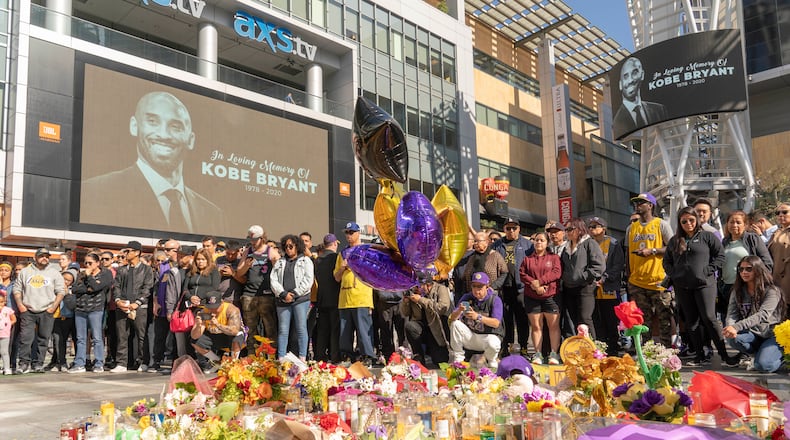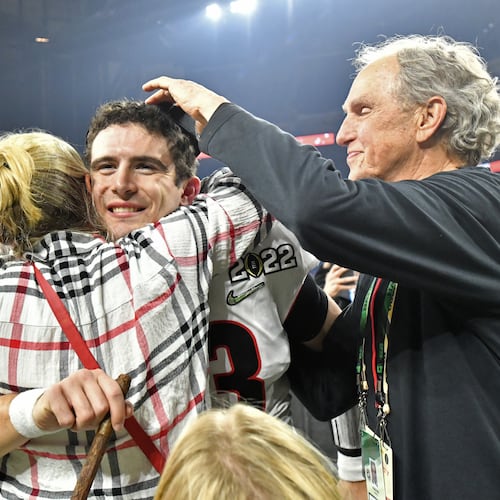Kobe Bryant’s life held no more intrinsic value than the other eight souls killed in Sunday’s helicopter crash. This much we must know.
Aboard that doomed craft was all the combined sadness of parents torn from their children’s lives, of spouses left behind, of three young girls gone with far too many empty pages in their diaries. There are no rankings for such losses, all equally inconceivable.
Yet it is Bryant for whom the world mourns, because he is the one the world knows.
The reaction at a time like this, when a towering sports figure dies a sudden, untimely death, stretches beyond the usual borders of grief. It really is something fascinating to behold and it once more affirms the long emotional reach of sports.
Fans gather near Bryant’s Los Angeles home court and leave tributes and speak of this like a death of a loved one, even if Bryant actually is less an acquaintance to any of them than the mailman or the kid who bags their groceries. But just watching him play at a level beyond anyone else on the same floor somehow built this intimate bond. His victories became theirs.
That bond extends across the entire world, that being the marketplace now of the NBA and Bryant particularly. Named for the famous beef of Kobe, Japan, Bryant really was a global brand.
“Your fearlessly striving spirit, whether in basketball or in life, is worthy of remembrance,” China’s People’s Daily wrote in tribute to a player who regularly visited the country to court its affections.
In Rieti, Italy, where Bryant’s father once played, the president of the local professional team told the AP, “It felt like we lost a family member last night. The entire city.”
His death certainly was felt in Atlanta, where any visit by Bryant’s Lakers was reason to actually attend a Hawks game. Sunday evening inside State Farm Arena, Trae Young led a wake that masqueraded as a game. Overflowing with respect, the kid did one of his idols right.
On Peachtree Street, another tribute: Georgia’s Own Credit Union will flash a purple and gold “THANK YOU MAMBA” sign atop its building through Wednesday. Bryant is on a nickname basis even here, nearly 2,200 miles from the franchise he called home.
Bryant’s legacy is now sadly and forever linked to those other athletes who have died too young, too suddenly, too inexplicably. Rock ‘n roll has nothing on sports when it comes to tragic crashes.
There is a separate place in our memories for certain of those whose great careers were underscored by a fatal accident.
Baseball gives the Roberto Clemente Award every year to the player who “best exemplifies the game of baseball, sportsmanship, community involvement and the individual's contribution to his team.” The Pirates star was three years younger than the 41-year-old Bryant when in 1972 he died in a plane crash off Puerto Rico, attempting to deliver aid to earthquake victims in Nicaragua.
And golf hands out the Payne Stewart Award to the gent whose “values align with the character, charity and sportsmanship that Stewart showed.” Back in 1999, the two-time major winner died when the private jet he was aboard failed to pressurize, wandered off course and crashed after running out of fuel.
How the NBA chooses to memorialize Bryant will be worth watching. The five-time NBA champion, a league and Finals MVP will go into the Hall of Fame this year by acclimation. The competitive heat he brought to his sport – an uncompromising and sometimes nettlesome nature he turned on opponents – is worthy of somehow perpetuating. But there also is the one ugly chapter of his legacy with which to contend, a 2003 rape allegation in Colorado that took 14 months to resolve. His accuser eventually declined to testify and settled a civil suit out of court in 2005. Bryant admitted to adultery, but never rape.
When actually taking account of all the well-known athletes who have died in a manner like Bryant, the list is rather stunningly long. It seems that our sports figures, no matter their stature or how indomitable they appear on game day, are just as vulnerable as the clumsiest among us.
Yankees captain Thurman Munson (plane crash, 1979).
The 1992 Daytona 500 winner Davey Allison (helicopter crash, 1993).
Charismatic distance runner Steve Prefontaine (car crash, 1975).
Two-time All Star pitcher Jose Fernandez (boating accident, 2016).
Two-time Cy Young winner Roy Halladay (2017) and former unbeaten heavyweight champion Rocky Marciano (1969), in plane crashes.
Lorenzo Charles, who will forever be known for slamming home the winning basket for North Carolina State in its NCAA championship upset of Houston in 1983. He died in 2011 when the bus he was driving crashed outside Raleigh.
That’s just to name a few of the athletes and the range of conveyances in which they met their end. To one extent or another, their deaths all caused a collective gasp within their sport.
In many of these sports-themed tragedies, there was the lone, well-known casualty. Nine people died Sunday when a helicopter went down near Calabasas, Calif. One of them was famous, his second act as a father and a creative entrepreneur cut obscenely short.
For so long, Kobe Bryant was a singular talent. He stood alone in his field. He was not alone Sunday. His is but the face of a many-layered heartbreak.
About the Author
The Latest
Featured



